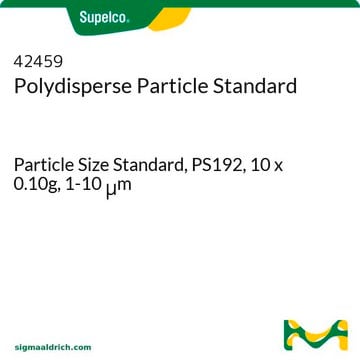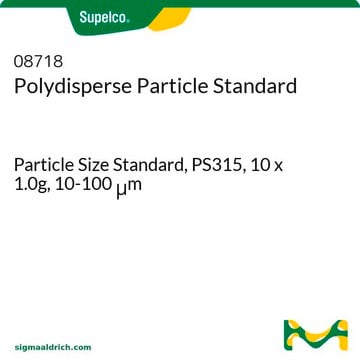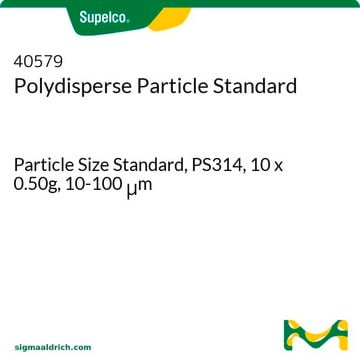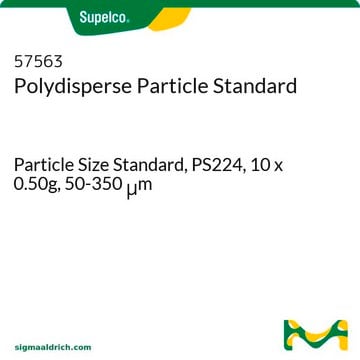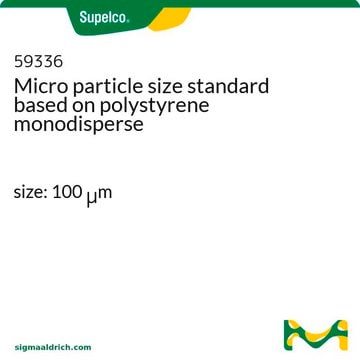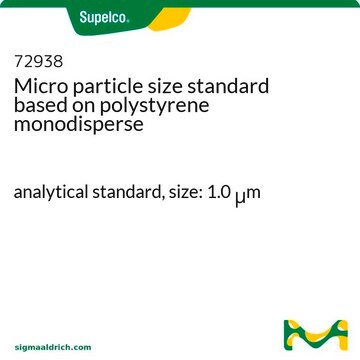94078
Polydisperse Particle Standard
Particle Size Standard, PS202, 10 x 0.10g, 3-30 μm
Sinónimos:
Particle size distribution standard
Iniciar sesiónpara Ver la Fijación de precios por contrato y de la organización
About This Item
UNSPSC Code:
41116107
NACRES:
NA.24
Productos recomendados
grade
analytical standard
form
particles
manufacturer/tradename
Whitehouse Scientific Ltd PS202
particle size
3-30 μm
application(s)
glass & ceramic
industrial qc
pharmaceutical
format
neat
¿Está buscando productos similares? Visita Guía de comparación de productos
General description
Polydisperse Particle Standard (PS202, size: 3-30 μm) is a particle size standard, ideal to determine the particle size distribution (PSD) of a particle system.
This product is produced by using gravitational sedimentation, microscopy and Coulter counter.
This product is produced by using gravitational sedimentation, microscopy and Coulter counter.
Application
Used to standardize particle size equipment.
It used to determine the precision and reproducibility of laser diffraction particle sizer.
It used to determine the precision and reproducibility of laser diffraction particle sizer.
Features and Benefits
- suitable for routine instrument calibration checks, testing and corrections
- available as a neat sample
signalword
Danger
hcodes
Hazard Classifications
Eye Dam. 1 - Skin Corr. 1B
Storage Class
8B - Non-combustible corrosive hazardous materials
wgk_germany
WGK 1
flash_point_f
Not applicable
flash_point_c
Not applicable
ppe
Eyeshields, Gloves, type N95 (US)
Elija entre una de las versiones más recientes:
¿Ya tiene este producto?
Encuentre la documentación para los productos que ha comprado recientemente en la Biblioteca de documentos.
Los clientes también vieron
Atmospheric dust dynamics in southern South America: A 14-year modern dust record in the loessic Pampean region
Cosentino NJ, et al.
Chemosphere, 30(4), 575-588 (2020)
Ground/satellite observations and atmospheric modeling of dust storms originating in the high Puna-Altiplano deserts (South America): Implications for the interpretation of paleo-climatic archives
Gaiero DM, et al.
Journal of Geophysical Research: Atmospheres, 118(9), 3817-3831 (2013)
Revisiting the chronology and environmental conditions for the accretion of late Pleistocene-early Holocene Pampean loess (Argentina)
Torre G, et al.
Chemosphere, 213, 105-119 (2019)
New insights on sources contributing dust to the loess record of the western edge of the Pampean Plain during the transition from the late MIS 2 to the early Holocene
Torre G, et al.
Chemosphere, 30(4), 537-545 (2020)
Soil variables that determine lead accumulation in Bidens pilosa L. and Tagetes minuta L. growing in polluted soils.
Salazar M J, et al.
Geoderma, 279, 97-108 (2016)
Nuestro equipo de científicos tiene experiencia en todas las áreas de investigación: Ciencias de la vida, Ciencia de los materiales, Síntesis química, Cromatografía, Analítica y muchas otras.
Póngase en contacto con el Servicio técnico